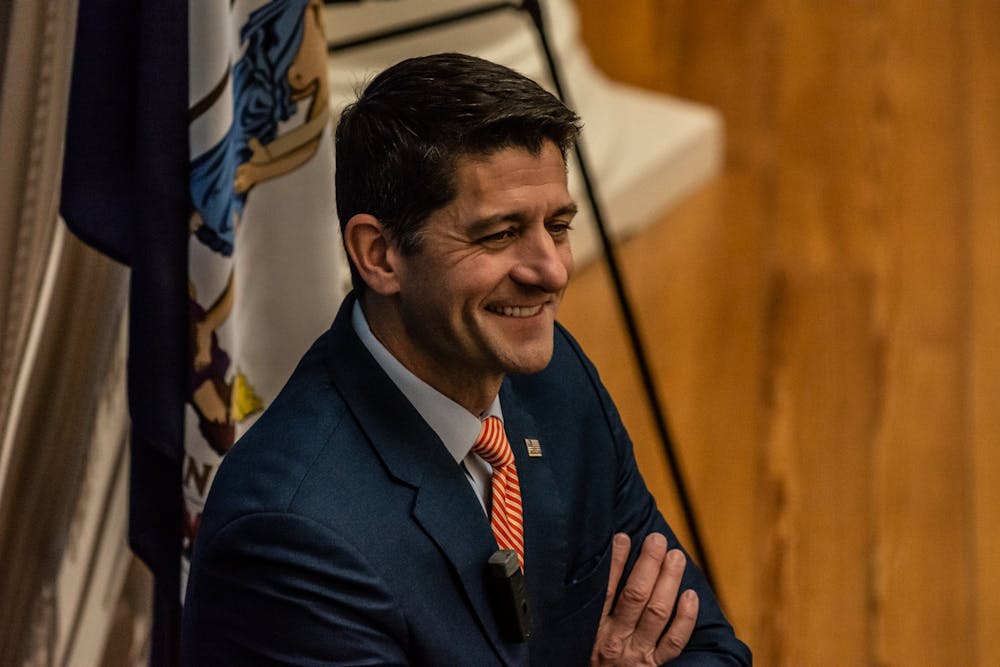The Center for Politics and the Frank Batten School of Leadership and Public Policy sponsored a forum Friday in the Rotunda Dome Room, where former Speaker of the House Paul Ryan discussed his time in office from Oct. 2015 to Jan. 2019 and commented on current political events. Professor Larry Sabato, director of the Center for Politics, moderated the conversation with Ryan.
Throughout his time as Speaker, Ryan’s major actions included overseeing an attempt to repeal the Affordable Care Act — which did not pass in the Senate — and passing a 2017 tax reform bill that focused on tax cuts.
The 2020 primary and general elections
Sabato opened the conversation with questions regarding the upcoming presidential election and asked Ryan to comment on how the current Democratic candidates would stand in an election against Donald Trump.
Ryan responded by first addressing Bernie Sanders’ candidacy.
“As an American, it's kind of scary to see that Bernie Sanders could be the nominee for the other major party of this country — a socialist,” Ryan said. “As a Republican … I love the idea of a Sanders candidacy … it gets me excited about the down ballot.”
Ryan elaborated, explaining how a more extreme Democratic candidate could make suburban voters who did not support Republican candidates in the 2018 midterm elections vote for Republican candidates.
“We lost our house — you know this — but we lost basically the suburbs,” Ryan said. “And so I think [Sanders] would be great to run against.”
Sabato agreed that a potential Sanders’ candidacy in the general election was likely to be beneficial for a down ballot — non-presidential, Republican elections — as he believes Sanders’ political views will drive the actions of Republican suburban voters.
Ryan also mentioned that, when comparing moderate Democratic candidates Mike Bloomberg and Joe Biden, he would consider Biden to have the better chance.
“The reason I say Joe is … he has a history of being able to get blue collar people,” Ryan said. “[Suburban swing voters] see Joe Biden as harmless.”
Ryan went on to say that Trump is likely to win the election regardless of who the Democratic candidate is that runs against him.
“No matter who he's running against, I think it's gotten to the point where the economy is so good, the numbers are so good,” Ryan said. “They will run a personality contest against him, because I don't think you can make a really compelling point or case against the incumbent when you have unemployment the lowest since 1969.”
Impeachment
Sabato then moved on to discuss Donald Trump’s impeachment hearings, asking Ryan about Senator Mitt Romney, who was the only Republican in either house to vote in favor of an article of impeachment. Ryan had been selected as Romney’s vice presidential nominee during his campaign for president in 2012.
Romney voted in support of the first article of impeachment — abuse of power — but not the second — obstruction of Congress. While still deliberating, Romeny explained his decision process in a statement to his constituents.
“This is not a situation anyone would wish upon our country,” Romney said. “It is difficult, divisive, and further inflames partisan entrenchment … I have spent—and will continue to spend—many hours in careful deliberation about what this process and its potential outcomes could mean for our country.”
Ryan responded by saying that he respected Romney’s vote, but disagreed with his decision.
“I think it was just purely a conscious vote,” Ryan said. “I don’t agree with the vote … I don't think we should remove a person from the ballot and deny [the people] the right to make their decision on who the next president is going to be.”
Family
Throughout the conversation, Ryan referenced his book, 'The Way Forward: Renewing the American Idea.' He commented on his family dynamic during his time as Speaker and then spoke to more recent decisions he has made to improve it.
“You know, our kids are in high school,” Ryan said. “Part of it’s my own childhood. I didn’t want to not know my kids while I was still alive.”
Ryan considers lack of time with family to be the biggest cost of working in Congress.
“That's the trade off in Congress,” Ryan said. “It's just time. Time away from your family.”
Ryan brought up how much more conducive his new schedule has been to spending time with his family now that he is no longer Speaker of the House.
Media
The conversation then moved to discuss the current media climate. Ryan expressed his concern that the positive and bipartisan work of Congress was not receiving adequate media coverage. In response, Sabato asked Ryan his opinion of which news organization or television outlet did the best job of reporting the news.
“Was any news organization or television outlet better than others in terms of reporting on [Congress’s successes]?” Sabato asked.
Ryan responded by first disclosing that he has ties to Fox News, but went on to say that there are reporters in every news organization whom he respects.
“I’m on the board of Fox, so full disclosure,” Ryan said. “As speaker you do two press conferences a week. You kind of get to know people in the media … So frankly I don’t want to put names out there but if there's a byline in the Post or the Times or the Wall Street Journal or Politico or the Hill, and I know the person, I always felt like that person really tries to get it right.”
From there, Ryan began to analyze general inaccuracy in online media sources. He did not mention any specific publications.
“But more and more these days … there's such competition for hits and clicks and ratings that it drives this narrativizing,” Ryan said. “And that sort of throws objectivism out the window. So that’s the new challenge.”







